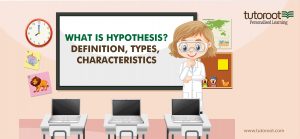What is Hypothesis? – Definition, Types, Characteristics
The hypothesis has resulted in some amazing scientific discoveries over the years, and scientists and inventors are still creating many hypotheses every day. For all the people who don’t know what a Hypothesis is? Here in this section, we will provide a short description, along with its various sources and characteristics.
What is Hypothesis?
First of all, the Hypothesis is described as an assumption that is generally made when some sort of evidence is found, to prove that the assumption can be true. Moreover, in this process, the first step is to translate all the questions into predictions. After this, the individuals will test the hypothesis, by comparing how it differs or varies under different variables.

Characteristics of the Hypothesis
There are certain characteristics that one must keep in mind while talking about the Hypothesis.
- The Relational hypothesis must be able to explain in detail each of the variables involved in the Hypothesis.
- Moreover, the hypothesis must be specific, and the individuals should be able to conduct more tests on it, to find out whether it’s true or false.
- Regardless of the significance of the Hypothesis, it is very important for scientists and investors to make the Hypothesis simple and easy, so that everyone can understand it easily.
- Besides this, the hypothesis should be able to have more evidence or facts, so that others can consider it reliable.
Types of Hypotheses
Based on the number of variables involved, and the significance relatability, the hypotheses are divided into multiple types. These types are described briefly in the below section.
Simple Hypothesis
As the name itself suggests, this hypothesis describes a relationship between a single independent variable and a dependent variable.
Directional Hypothesis
If the inventor, or researcher, is looking to get one particular outcome from the Hypothesis, especially by using the different variables to predict its nature.
Null Hypothesis
When there is no relationship between the dependent and independent variable, then it is referred to as the Null Hypothesis.
Complex Hypothesis
In a hypothesis, when there are two or more dependent/ independent variables involved, then it is defined as a Complex Hypothesis.
Associative and Casual Hypothesis
When a change in one variable involved in the Hypothesis, automatically causes a change in another variable, then it is stated as an Associative and Casual Hypothesis.
Non-directional Hypothesis
If the researcher is trying to find a new hypothesis, one that does not have any kind of relationship between one independent or dependent variable, and is not focused on getting a particular type of result.
Sources of Hypothesis
Similar to the Characteristics, there need to be different types of sources, in order to start a hypothesis, or test it using multiple variables. These sources are,
- One of the main sources of most alternate hypotheses is the scientific theories that are backed by some evidence.
- Besides, the thinking process of the people, or the new popular trends in the media, also supports the hypothesis.
- Moreover, history and the present-day scenarios, and the comparison between the two results in Hypothesis.
- When a phenomenon has a resemblance with an event or variables whether it is dependent or independent, then it is considered a source or formulation of a Hypothesis.
Conclusion
In the above article, we have talked about the Hypothesis in much more detail, as well as its various characteristics, types, and sources. And so, you know there are many other complex topics involved in Physics that are very hard to grasp. So, for these people, online coaching classes might be helpful. One such online interactive class with various unique benefits and cost-effective prices is offered by the Tutoroot platform. If you want to learn more about these classes, then visit the official platform.
